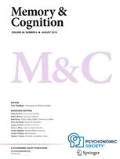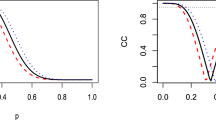Abstract
Many studies have shown that the deductive inferences that people make have global properties that reflect the statistical information implicit in the premises. This suggests that such reasoning can be explained by a single, underlying probabilistic model. In contrast, the dual-process model of conditional reasoning (Verschueren, Schaeken, & d’Ydewalle, 2005b) proposes that people can use either a logical, counterexample-based strategy or a probabilistic one. In two studies, we presented reasoners with sequences of affirmation-of-the-consequent inferences that differed with respect to the statistical properties of the premises, either explicitly or implicitly. As predicted by the dual-process model, an analysis of individual response patterns showed the presence of two distinct strategies, with use of the counterexample strategy being associated with higher levels of abstract-reasoning competence. Use of the counterexample strategy was facilitated by the explicit presentation of counterexample information. In a further study, we then examined explicitly probabilistic inferences. This study showed that although most reasoners made statistically appropriate inferences, the ability to make more-accurate inferences was associated with higher levels of abstract-reasoning competence. These results show that deductive inferential reasoning cannot be explained by a single, unitary process and that any analysis of reasoning must consider individual differences in strategy use.
Similar content being viewed by others
References
Cummins, D. D. (1995). Naive theories and causal deduction. Memory & Cognition, 23, 646–658. doi:10.3758/BF03197265
Cummins, D. D., Lubart, T., Alksnis, O., & Rist, R. (1991). Conditional reasoning and causation. Memory & Cognition, 19, 274–282. doi:10.3758/BF03211151
De Neys, W., Schaeken, W., & d’Ydewalle, G. (2002). Causal conditional reasoning and semantic memory retrieval: A test of the semantic memory framework. Memory & Cognition, 30, 908–920. doi:10.3758/BF03195776
De Neys, W., Schaeken, W., & d’Ydewalle, G. (2003a). Causal conditional reasoning and strength of association: The disabling condition case. European Journal of Cognitive Psychology, 15, 161–176.
De Neys, W., Schaeken, W., & d’Ydewalle, G. (2003b). Inference suppression and semantic memory retrieval: Every counterexample counts. Memory & Cognition, 31, 581–595. doi:10.3758/BF03196099
Evans, J. St B. T., Handley, S. J., Neilens, H., & Over, D. (2010). The influence of cognitive ability and instructional set on causal conditional inference. Quarterly Journal of Experimental Psychology, 63, 892–909. doi:10.1080/17470210903111821
Evans, J. St B. T., & Over, D. E. (2004). If. Oxford, U.K.: Oxford University Press.
Evans, J. St B. T., Over, D. E., & Handley, S. J. (2005). Suppositions, extensionality, and conditionals: A critique of the mental model theory of Johnson-Laird and Byrne (2002). Psychological Review, 112, 1040–1052. doi:10.1037/0033-295X.112.4.1040
Geiger, S. M., & Oberauer, K. (2007). Reasoning with conditionals: Does every counterexample count? It’s frequency that counts. Memory & Cognition, 35, 2060–2074. doi:10.3758/BF03192938
Handley, S. J., Capon, A., Copp, C., & Harper, C. (2002). Conditional reasoning and the tower of Hanoi: The role of spatial and verbal working memory. British Journal of Psychology, 93, 501–518.
Janveau-Brennan, G., & Markovits, H. (1999). The development of reasoning with causal conditionals. Developmental Psychology, 35, 904–911. doi:10.1037/0012-1649.35.4.904
Johnson-Laird, P. N., & Byrne, R. M. J. (1991). Deduction. Hove, U.K.: Erlbaum.
Johnson-Laird, P. N., & Byrne, R. M. J. (2002). Conditionals: A theory of meaning, pragmatics, and inference. Psychological Review, 109, 646–678. doi:10.1037/0033-295X.109.4.646
Klauer, K. C., Beller, S., & Hütter, M. (2010). Conditional reasoning in context: A dual-source model of probabilistic inference. Journal of Experimental Psychology: Learning, Memory, and Cognition, 36, 298–323. doi:10.1037/a0018705
Liu, I.-M. (2003). Conditional reasoning and conditionalization. Journal of Experimental Psychology: Learning, Memory, and Cognition, 29, 694–709. doi:10.1037/0278-7393.29.4.694
Markovits, H., & Barrouillet, P. (2002). The development of conditional reasoning: A mental model account. Developmental Review, 22, 5–36.
Markovits, H., Fleury, M.-L., Quinn, S., & Venet, M. (1998). The development of conditional reasoning and the structure of semantic memory. Child Development, 69, 742–755.
Markovits, H., & Handley, S. (2005). Is inferential reasoning just probabilistic reasoning in disguise? Memory & Cognition, 33, 1315–1323.
Markovits, H., Lortie-Forgues, H., & Brunet, M.-L. (2010). Conditional reasoning, frequency of counterexamples, and the effect of response modality. Memory & Cognition, 38, 485–492. doi:10.3758/MC.38.4.485
Markovits, H., & Thompson, V. (2008). Different developmental patterns of simple deductive and probabilistic inferential reasoning. Memory & Cognition, 36, 1066–1078.
Markovits, H., & Vachon, R. (1990). Conditional reasoning, representation, and level of abstraction. Developmental Psychology, 26, 942–951. doi:10.1037/0012-1649.26.6.942
Oaksford, M., Chater, N., & Larkin, J. (2000). Probabilities and polarity biases in conditional inference. Journal of Experimental Psychology: Learning, Memory, and Cognition, 26, 883–899. doi:10.1037/0278-7393.26.4.883
Oberauer, K. (2006). Reasoning with conditionals: A test of formal models of four theories. Cognitive Psychology, 53, 238–283. doi:10.1016/j.cogpsych.2006.04.001
Quinn, S., & Markovits, H. (1998). Conditional reasoning, causality, and the structure of semantic memory: Strength of association as a predictive factor for content effects. Cognition, 68, B93–B101.
Rips, L. J. (2001). Two kinds of reasoning. Psychological Science, 12, 129–134. doi:10.1111/1467-9280.00322
Singmann, H., & Klauer, K. C. (2011). Deductive and inductive conditional inferences: Two modes of reasoning. Thinking & Reasoning, 17, 247–281. doi:10.1080/13546783.2011.572718
Venet, M., & Markovits, H. (2001). Understanding uncertainty with abstract conditional premises. Merrill-Palmer Quarterly, 47, 74–99.
Verschueren, N., Schaeken, W., & d’Ydewalle, G. (2005a). A dual-process specification of causal conditional reasoning. Thinking & Reasoning, 11, 239–278. doi:10.1080/13546780442000178
Verschueren, N., Schaeken, W., & d’Ydewalle, G. (2005b). Everyday conditional reasoning: A working memory–dependent tradeoff between counterexample and likelihood use. Memory & Cognition, 33, 107–119. doi:10.3758/BF03195301
Author note
Preparation of the manuscript was supported by a Discovery Grant from the Natural Sciences and Engineering Council of Canada (NSERC) to the first author and by NSERC graduate scholarships to the second and third authors.
Author information
Authors and Affiliations
Corresponding author
Rights and permissions
About this article
Cite this article
Markovits, H., Forgues, H.L. & Brunet, ML. More evidence for a dual-process model of conditional reasoning. Mem Cogn 40, 736–747 (2012). https://doi.org/10.3758/s13421-012-0186-4
Published:
Issue Date:
DOI: https://doi.org/10.3758/s13421-012-0186-4



